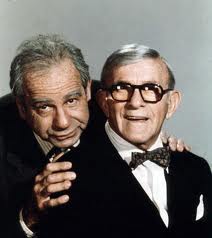• As I’ve written elsewhere, I no longer find Neil Simon’s plays to be very funny. His insert-flap-A-in-slot-B style of joke-driven comedy strikes me as a rusty relic of the increasingly distant past. But there are those who insist that there’s more to Simon than his punchlines, and so I took a look at the 1975 film version of The Sunshine Boys the other day in an attempt to see for myself what his critical advocates see in him. I tried to watch The Sunshine Boys a couple of years ago and couldn’t get anywhere with it–but this time I saw the film from a different point of view.
 What hit me forcibly on a second viewing was that Willie Clark, the character played in the film by Walter Matthau, is not merely an absent-minded old grouch but is all too clearly suffering from dementia. Yes, Simon plays his confusion for laughs–he plays everything for laughs–but anyone who has spent time with a friend or relative afflicted with Alzheimer’s disease will immediately spot the symptoms, which are portrayed with next to no comic exaggeration:
What hit me forcibly on a second viewing was that Willie Clark, the character played in the film by Walter Matthau, is not merely an absent-minded old grouch but is all too clearly suffering from dementia. Yes, Simon plays his confusion for laughs–he plays everything for laughs–but anyone who has spent time with a friend or relative afflicted with Alzheimer’s disease will immediately spot the symptoms, which are portrayed with next to no comic exaggeration:
BEN It’s Monday, not Wednesday…didn’t you know it was Monday?
WILLIE I remembered but I forgot.
In 1972, when The Sunshine Boys opened on Broadway, the phrase “Alzheimer’s disease” had yet to become part of the national lexicon. I recently shared a platform with Marion Roach, who mentioned in passing that a piece about her mother’s battle with Alzheimer’s that she wrote for the New York Times Magazine in 1983 was, unlikely as it may sound, the first first-person account of the disease ever to be published. A quarter-century later, we all know what Alzheimer’s disease is, and damned few of us are inclined to laugh at it.
I still don’t think The Sunshine Boys is all that funny, but when you view it not as a comedy but as a drama, the punchlines recede in salience and you find yourself confronted with a portrait of an angry, frightened old man that is fraught with something not far removed from pathos. So given the fact that Neil Simon’s plays haven’t been doing especially well in revival of late, I find myself wondering: what would The Sunshine Boys be like if it were staged not for laughs but truth, the way that Matthew Warchus staged last year’s Broadway revival of Alan Ayckbourn’s The Norman Conquests?
As I wrote in my Wall Street Journal review of that remarkable production:
Matthew Warchus is well aware of the bleak undertones of “The Norman Conquests.” He went so far in a recent interview as to claim that he’d directed the triptych “as if it’s Chekhov.” I wouldn’t go quite as far as that: Mr. Warchus is a master of physical comedy, and each installment is full of the same knockabout antics that can be seen in his production of “God of Carnage,” which is currently playing to packed houses on Broadway. But he also understands the delicate art of silence, and “The Norman Conquests” is no less full of moments of stillness when the laughter dies away and all you can hear is the keening sound of sorrow.
Perhaps Simon’s play isn’t strong enough to stand up to that kind of tough-minded treatment. David Cromer, after all, staged Brighton Beach Memoirs that way, and it closed after just nine performances. But what if some similarly inclined director were to mount The Sunshine Boys not on Broadway but in a small, first-class regional house like, say, Palm Beach Dramaworks or Chicago’s Writers’ Theatre, where the audience, instead of insisting on being “entertained,” would presumably be more willing to go where the production led them?
“If [Simon’s] plays continue to be performed,” I wrote in my Wall Street Journal review of Brighton Beach Memoirs, “it will only be because actors and directors have found a new way of performing them, one that cuts through the punch lines to find a deeper, more enduring dramatic truth.” Might The Sunshine Boys be the place to start?
* * *
A studio featurette about the making of the film version of The Sunshine Boys:
